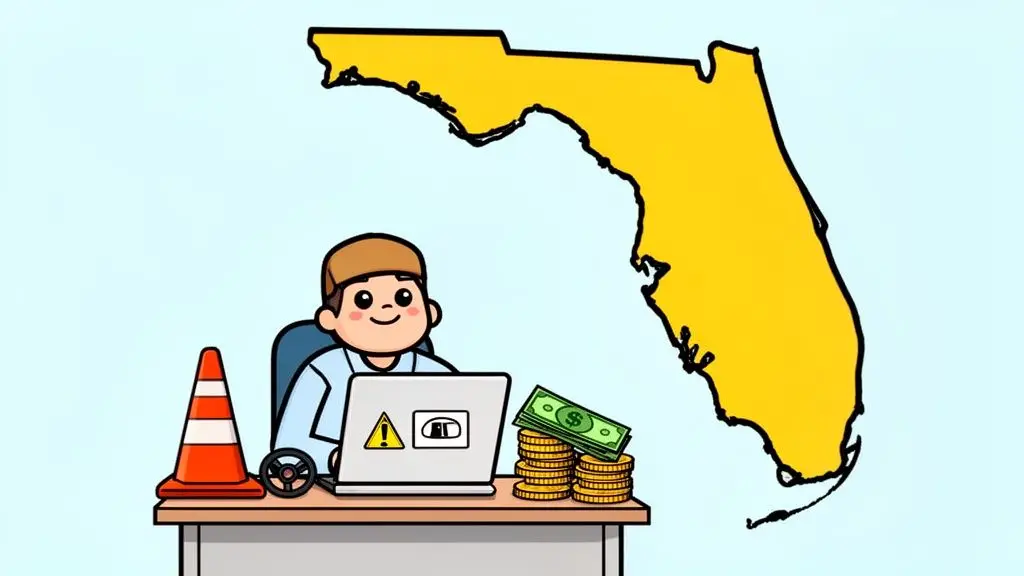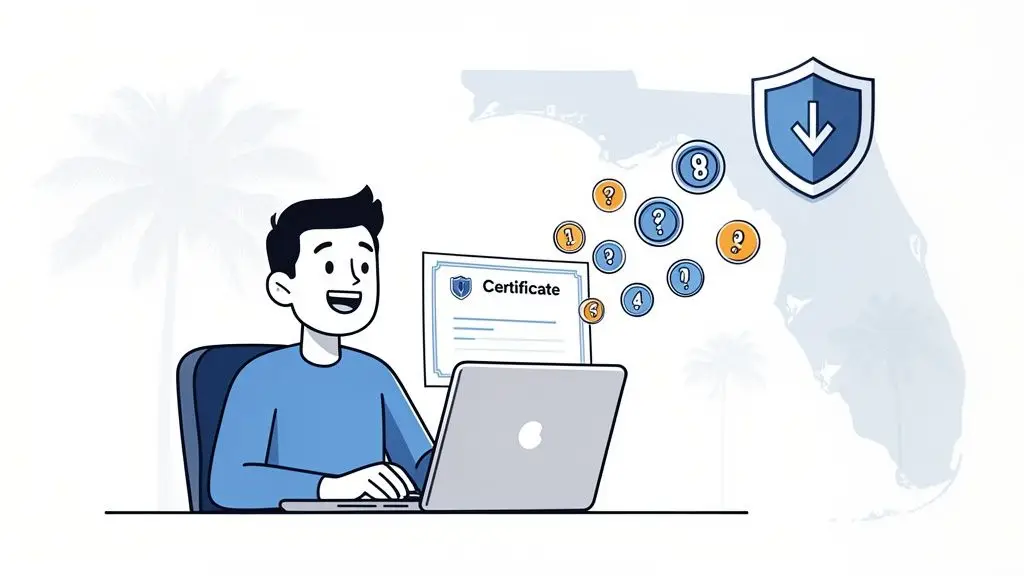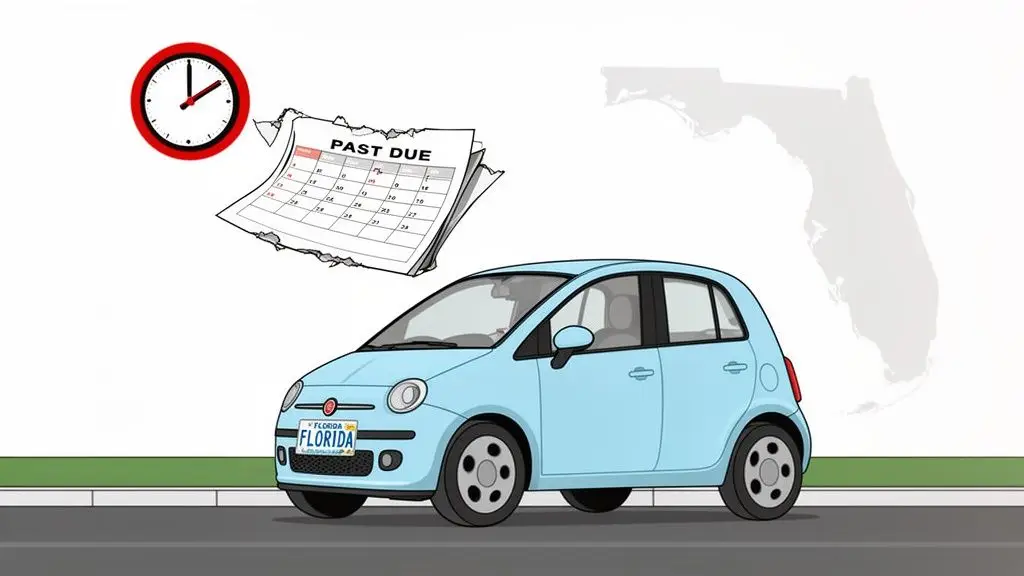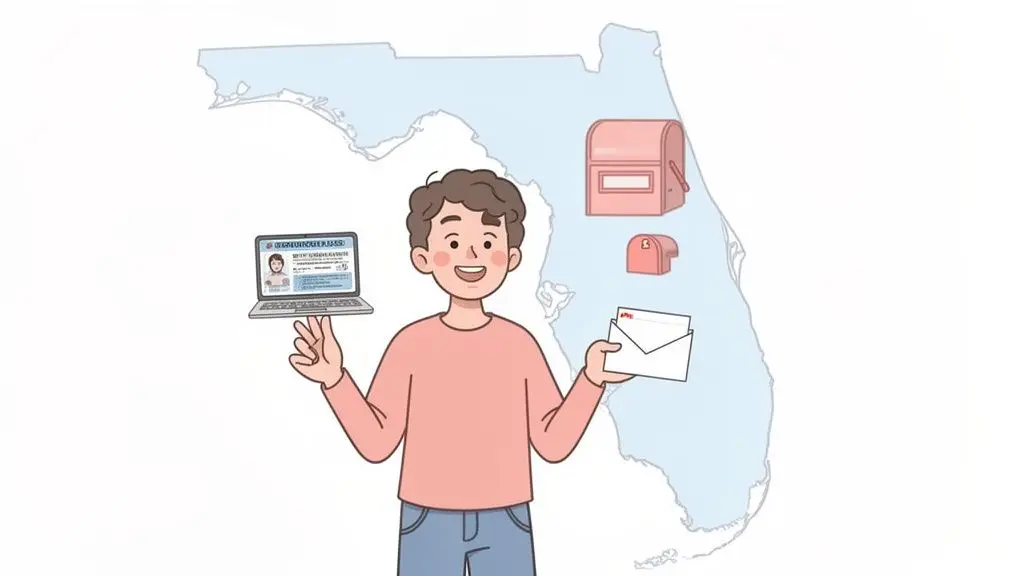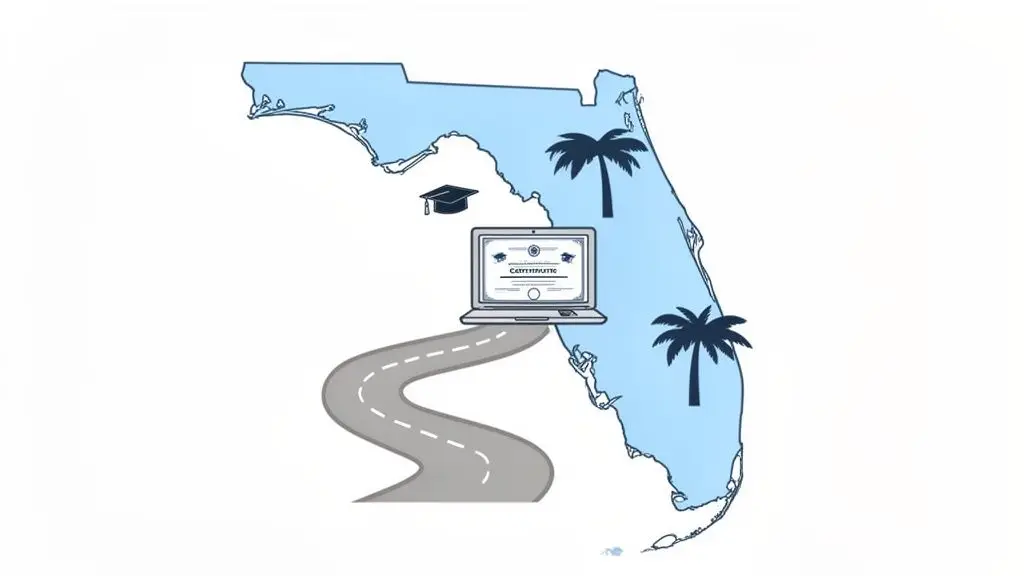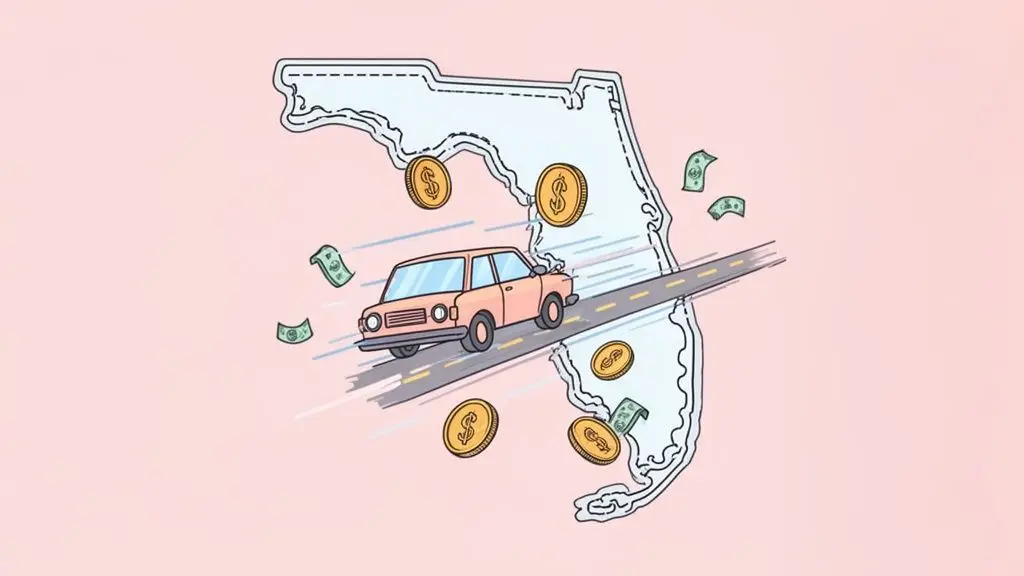Getting that envelope in the mail with a “Notice of Violation” can make your heart sink. But before you panic about a red light camera Florida ticket, take a deep breath. This is a very common thing for drivers, and understanding your options is simple. Taking action, like enrolling in one of the premier traffic schools Florida offers, is what really counts for protecting your driving record and your wallet. We offer a fast and easy way to solve your driver education needs, with instant certificates.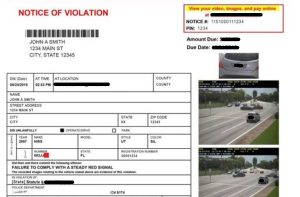
What Happens When You Get a Red Light Camera Ticket
That official-looking letter is what’s known as a “Notice of Violation.” Think of it less as a formal ticket and more as a first warning. Florida Statute 316.0083 is very specific: this notice has to be mailed to the vehicle’s registered owner within 30 days of the camera catching the violation. You can see the full law at the Florida Senate official website.
When you open it, you’ll find the proof—usually photos or a link to a video showing your car entering the intersection after the light turned red. All the key details will be there: the date, time, and exact location of the intersection. For example, you might see a picture of your car with the license plate clearly visible, crossing the white line while the traffic light is red.
The Initial Fine and Your Options
The first fine for a red light camera violation is a flat $158. This isn’t a random number; it’s set by Florida law, so it’s the same amount no matter where you are in the state.
Here’s the good news: if you just pay this fine by the due date, that’s the end of it. No points go on your license, and your insurance company never even finds out. For most people, this is the quickest and easiest way to put the whole thing behind them.
But ignoring that notice is where the real trouble starts. If you go past the deadline without paying the $158, the violation turns into a Uniform Traffic Citation (UTC).
A Uniform Traffic Citation is a different story. The fine jumps to around $262, and now it’s officially reported to the Florida Department of Highway Safety and Motor Vehicles (DHSMV). At this point, it’s a moving violation that can add points to your license.
To help you sort through this first step, here’s a quick rundown of what that initial notice really means for you.
Florida Red Light Camera Violation Quick Facts
| Violation Detail | What It Means for You |
|---|---|
| Notice of Violation | This is a civil penalty, not a formal traffic ticket (yet). It’s sent to the vehicle’s owner. |
| Initial Fine | $158, as required by Florida state law. |
| Payment Deadline | You have a set amount of time (listed on the notice) to pay the initial fine. |
| No Points if Paid | If you pay the $158 on time, no points are added to your license, and insurance isn’t notified. |
| Evidence Provided | The notice includes photos or video evidence of the violation. |
Understanding these basics is key to making the right choice and avoiding a much bigger headache.
From Notice to Citation
The difference between that first notice and a full-blown Uniform Traffic Citation is huge. The notice is a local civil matter; the UTC is a formal traffic violation with statewide consequences. And these aren’t rare—in 2020 alone, more than 1.2 million red light camera notices were sent out across 49 jurisdictions in Florida. You can discover more insights on just how common these cameras are and their impact on communities.
The system is designed to give you an out before it gets serious. But even if the situation does turn into a UTC, you aren’t out of options. The smartest move you can make is to elect to take a BDI course, also known as a basic driver improvement course.
This driver safety course is a guaranteed way to keep points off your record after you get a citation. It’s a lifesaver for anyone wanting to keep a clean driving history. We offer a fast and easy 4-hour driving course Florida online to get it done without the hassle.
Understanding Florida Red Light Camera Laws
If you’ve ever gotten a ticket in the mail after driving through a Florida intersection, you’re not alone. To really get a handle on how these tickets work, you have to look at the specific law that makes it all happen. It’s not just a city-by-city decision; it’s a statewide system designed to automatically catch certain violations, and the best online traffic school florida can help you navigate it.
The whole thing is governed by a state rule called the Mark Wandall Traffic Safety Act. This law gives cities and counties the green light to use cameras to photograph cars running red lights and then mail a violation notice directly to the vehicle’s registered owner.
Think of the camera as an automated traffic cop that’s only looking for one specific mistake. Understanding how this differs from being pulled over by a human officer is key to knowing your options.
The Law Behind The Lens
The specific statute that puts the teeth into the system is Florida Statute 316.0083. This is the official playbook for red light camera enforcement. It lays out exactly what counts as a violation, how the notice has to be sent, and what penalties to expect.
Here’s the most important part for drivers: the initial violation notice is treated as a civil penalty, not a standard moving violation. This is a huge benefit for Florida drivers.
This is a huge advantage. If you pay the initial $158 fine on time, you get zero points on your driver’s license. That’s a big deal because it also means your insurance rates won’t be affected. For example, if you get a notice and pay it, it’s like it never happened in the eyes of your insurance company.
As you can see from the statute, the law is very clear about the process. It gives drivers a simple way to handle the situation without it harming their driving record.
How These Rules Connect to Broader Safety Efforts
Florida’s camera program isn’t operating by itself. It’s part of a nationwide push to make our roads safer. Major organizations like the National Highway Traffic Safety Administration (NHTSA) have identified red light running as a leading cause of severe T-bone collisions—some of the most dangerous crashes on the road. You can review safety information directly on the NHTSA website.
By setting up automated cameras at high-risk intersections, the goal is to change driver behavior and reduce these deadly accidents. It’s a way to encourage drivers to be more careful, even when there isn’t a police car in the rearview mirror.
Of course, mistakes still happen, and sometimes these situations escalate beyond the initial notice to a formal traffic citation. If that happens, remember that taking a driver improvement school online is your best defense. For a deeper look into the legal side of things, you can read also our complete guide on Florida red light cameras. Staying informed is the best way to protect your driving record.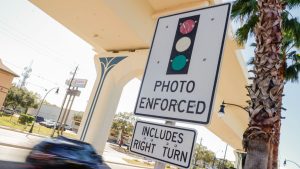
Your Options After Receiving a Violation Notice
So, a Notice of Violation for a red light camera Florida incident landed in your mailbox. The good news is you’re in the driver’s seat now. You have a few clear paths you can take, and knowing your options is key to protecting both your wallet and your driving record. What you decide in the next 30 days will determine if this is a simple, no-point issue or if it turns into something more serious.
This image breaks down the decision-making process for you.
As you can see, your choice really boils down to how clear the evidence is and whether you’re willing to pay the fine. Let’s dig into what each option really means for you.
Option 1: Pay the Fine and Move On
The most direct route is to simply pay the $158 fine. Your notice will have clear instructions for paying online, by mail, or in person. This is hands-down the fastest way to put the whole thing behind you.
Here’s why this is often the best choice for Florida drivers:
- No Points: When you pay this initial notice on time, zero points are added to your license. It’s treated more like a parking ticket.
- No Insurance Impact: Since no points are assessed, your insurance company won’t be notified. That means no surprise rate hikes.
- It’s Over: Once that payment is made, the matter is completely closed. No follow-ups, no court dates, nothing.
For most drivers, this is the path of least resistance. It’s a clean, final resolution that keeps your driving record spotless and is easier than dealing with a traffic ticket school florida.
Option 2: Contest the Violation in Court
Think the ticket was a mistake? You absolutely have the right to challenge it. Maybe it wasn’t even your car, the photos are too blurry to identify anything, or you had a valid reason for being in the intersection, like clearing the way for an ambulance. A practical example: if a large truck blocked your view of the light and you entered the intersection safely, you might have a case.
To contest the ticket, you must formally request a hearing with the local traffic court before the payment deadline on your notice. If you let that date pass, you lose your right to a hearing.
This path means you’ll present your case to a judge or magistrate. If you make a convincing argument, the violation gets dismissed—case closed. If you lose, however, you’ll be on the hook for the fine and potentially some court costs. Be sure you have your evidence ready to go. It’s also a smart move to read up on the process; our guide on how to handle a red light ticket offers some great advice.
Option 3: Ignore the Notice (And Face the Consequences)
Let’s be blunt: doing nothing is the worst thing you can do. If you toss the Notice of Violation in a drawer and miss the payment deadline, the problem doesn’t just go away. It gets much, much worse.
Here’s the domino effect of ignoring the notice:
- Uniform Traffic Citation (UTC): The county will issue a formal, more serious traffic citation. This isn’t just a notice anymore; it’s a real ticket.
- Increased Fine: The cost shoots up from $158 to $262 or even more, once local court fees are tacked on.
- Points on Your License: That new UTC is a moving violation. If you’re found guilty, you’ll get points added to your Florida driver’s license.
- Insurance Rate Hikes: Points on your record are a red flag for insurers, almost guaranteeing higher premiums for years.
Taking this route turns a minor annoyance into a costly, long-term headache. The state provides simple ways to handle these notices precisely to help drivers avoid these penalties. Whether you pay the fine or fight it in court, the key is to take action.
The Smart Choice: A Basic Driver Improvement Course
So, that initial violation notice has turned into an official Uniform Traffic Citation (UTC). It might feel like you’re out of good options, but you’re not. You still have a powerful tool at your disposal to protect your driving record: electing to take a Basic Driver Improvement Course, what most people simply call a BDI course.
Honestly, for most drivers facing points on their license from any traffic citation, this is the smartest move you can make.
Think of your driving record as a report card that insurance companies look at. Points are like bad grades that stay with you for years, screaming “high-risk driver!” to anyone who looks. That, in turn, can send your insurance premiums through the roof.
The good news is that completing a state-approved BDI course acts like an eraser. It wipes the points from that citation right off your record, keeping it clean and preventing your insurance rates from climbing.
The Power of Electing Traffic School
Once that UTC is in your hand, the clock starts ticking. The first, most critical step is to notify the Clerk of Court in the county where you got the ticket that you intend to take traffic school. Don’t skip this part!
After you’ve made that official election, you can enroll in a driver safety course. The benefits are huge, both right away and down the road:
- No Points on Your Record: This is the big one. When you pass a BDI driving course, the state withholds the points, meaning they never hit your license.
- Avoid Insurance Hikes: Because no points are added, your insurance provider won’t have a reason to raise your rates due to the violation.
- Become a Safer Driver: These driver education courses aren’t just about checking a box. They’re a fantastic refresher on Florida traffic laws and defensive driving techniques that genuinely make you a more aware and confident driver.
Making this choice is about taking control of the situation to sidestep long-term financial headaches. If you want to see exactly how it works, you can learn more about our Florida Basic Driver Improvement Course.
Unmatched Convenience with an Online Driving School
Not too long ago, “traffic school” meant giving up a Saturday to sit in a stuffy classroom. Thankfully, those days are over. Today, the process is incredibly convenient with florida approved traffic schools that operate online. Our company offers the premier tools to solve driver education needs in a fast and easy way.
Our 4 hour traffic school Florida is built for modern, busy lives. You can tackle the entire thing from your couch, the office, or anywhere with an internet connection. The material is broken into simple, easy-to-understand sections that you can work through whenever it fits your schedule.
This proactive approach puts you in the driver’s seat. You’re not just dealing with a ticket; you’re investing in a cleaner record and potentially lower insurance costs for years.
The best part? No waiting around for a certificate to show up in the mail, which is a huge relief when you’re on a court deadline. The moment you finish, your certificate of completion is ready to download instantly. You can then submit it directly to the clerk—and many Florida counties even let you do this online, making the entire process seamless.
Know Your Rights: Florida law explicitly gives you this option. Under Florida Statute 318.14(9), you can choose to attend a basic driver improvement course to avoid points for a moving violation. You can use this benefit once every 12 months and up to five times in your entire life.
The History And Impact Of Cameras On Florida Roads
Red light cameras feel like a permanent fixture on Florida’s roads, but their story is more complicated and goes back further than most people realize. To really get a handle on the current debate, you have to look at where they came from and the mixed results they’ve produced over the years. It’s definitely not a simple tale of good vs. bad.
The idea of automated traffic enforcement actually started bubbling up in the mid-1990s. One of the very first major trials took place in Polk County, with a pilot program running from 1994 to 1996. The results were pretty surprising. At the time, traditional police patrols were ticketing maybe 15 to 30 red-light runners per year in the area. The cameras? They caught an average of 5 to 20 violations per day. This early experiment made it very clear that automated systems could spot many more infractions than a human officer ever could.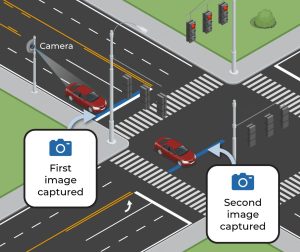
A Mixed Bag of Results
It wasn’t until 2010, with the passing of the Mark Wandall Traffic Safety Act, that Florida officially gave red light cameras the green light statewide. The main goal was clear: reduce the number of dangerous T-bone crashes. And on that front, there’s been some success. Many cities using the cameras have seen a noticeable drop in violations at those intersections.
However, the bigger picture is a lot less clear. Multiple studies have pointed out a troubling trend: while serious T-bone crashes may go down, rear-end collisions often go up at the same camera-enforced lights. Why? Drivers panic. They see a yellow light, know a camera is watching, and slam on their brakes, leaving the person behind them with nowhere to go. This has fueled a fierce, ongoing debate—are the cameras truly about safety, or are they just reliable money-makers for local governments?
No matter where you stand on that debate, getting a ticket is a headache. If you find yourself with one, it pays to understand the system. We offer detailed traffic court advice to help you figure out your next steps.
Red Light Camera Impact: A Look at the Numbers
The data on red light cameras tells a story of trade-offs. While they often achieve their main goal of reducing red-light running, they can introduce other problems. Here’s a quick look at what the numbers often show.
| Metric | Reported Outcome | Source Highlight |
|---|---|---|
| Red-Light Violations | Significant Decrease | Cities consistently report fewer drivers running red lights at camera locations. |
| T-Bone Crashes | General Decrease | The most dangerous type of intersection crash is often reduced. |
| Rear-End Collisions | Frequent Increase | A common side effect as drivers brake abruptly to avoid tickets. |
| Overall Crashes | Mixed/Inconclusive | Some studies show a net safety benefit, while others show no change or an increase. |
Ultimately, the statistics suggest that while cameras can change driver behavior in one way, they can unintentionally create new risks in another, keeping the debate over their net benefit alive and well.
The Proven Solution: Driver Education
While politicians, safety experts, and drivers argue about the pros and cons of cameras, one solution’s effectiveness is undisputed: driver education. At the end of the day, the goal of any traffic law is to foster safer driving habits. Whether you get a ticket from a camera or an officer in a patrol car, the single most powerful tool you have for improvement is a driver education course.
Taking a bdi course florida is about more than just dealing with a ticket. It’s a chance to genuinely sharpen the defensive driving skills that prevent you from getting into a dangerous situation in the first place.
This is where a florida approved defensive driving course online really proves its worth. It lets you be proactive.
The ultimate benefit for Florida drivers is control. You can’t control where cities place cameras, but you can control how you drive and how you respond to a citation. Choosing to take a driver improvement school online is a direct action that keeps your record clean and makes you a safer presence on the road for everyone.
Enrolling in a bdi course online is a small investment of your time that delivers a huge return. You’ll learn to spot hazards sooner, get a clearer understanding of right-of-way rules, and build the confidence to navigate any intersection safely—camera or not. It’s no wonder so many drivers feel our basic driver course florida is the best online traffic school available.
Common Questions About Florida Traffic School
Getting a red light camera Florida ticket can be confusing, and it’s natural to have questions. Let’s break down some of the most common concerns drivers have. Think of this as your guide to making the right call, whether that means simply paying a notice or enrolling in one of the best traffic schools Florida has to offer.
Will A Red Light Camera Ticket Put Points On My Florida License?
This is the number one question on everyone’s mind, and here’s the short answer: not right away. When you first get that $158 “Notice of Violation” in the mail and pay it on time, no points go on your license. The state treats it like a civil fine—similar to a parking ticket—so your insurance company won’t even hear about it.
The situation changes if you ignore that initial notice. If you don’t pay it, it can escalate into a formal Uniform Traffic Citation (UTC), which is a real moving violation. That’s when points become a real risk.
However, you have a powerful tool at your disposal: electing to complete a BDI course. Taking a course from a state of Florida approved traffic school is your guaranteed way to stop those points before they ever tarnish your driving record.
How Many Times Can I Take Traffic School In Florida?
The good news is that Florida law allows for second chances. You can take a basic driver improvement course to get rid of ticket points once every 12 months.
There’s a lifetime cap, though—you can only use this option a total of five times. Since you have a limited number of “get out of jail free” cards, it’s wise to save them for violations that actually carry points. Our fully approved 4-hour driving course florida online is built to satisfy all state requirements and keep your record clean.
What’s The Easiest And Fastest Way To Complete A BDI Course?
Hands down, the simplest route is an approved online traffic school. Gone are the days of giving up a whole Saturday to sit in a stuffy classroom. Now, you can get the entire thing done right from your own home at the lowest price on florida traffic school.
We’ve designed our BDI course online to be as painless as possible. You can move through the material at your own speed, whenever you have time, using whatever device you prefer—your computer, tablet, or even your phone.
The best part? You get your certificate of completion the second you finish, so you can get it over to the Clerk of Court without any stress or last-minute scrambling. You can register for our driver improvement school online in just a couple of minutes.
Do I Still Have To Pay The Fine If I Take Traffic School?
Yes, and this is a critical point that trips a lot of people up. Choosing to take traffic school for a Uniform Traffic Citation doesn’t make the fine disappear. You have to think of it as a two-step process:
- First, you pay the fine required by the court.
- Second, you complete the drivers safety course to prevent the points.
Taking the basic driver traffic school Florida course is your investment in a clean driving history and stable insurance rates. While people debate how effective red light cameras are, the numbers don’t lie. Between 2015 and 2016 alone, Florida issued over 1.2 million camera notices. You can read more on these traffic safety statistics to get a sense of the scale.
Ultimately, taking a florida approved defensive driving course online is the most reliable way to sharpen your skills and protect your record.
Ready to keep your driving record clean and those points away? Our company offers a fast, easy, and state-approved online driving school experience. Our BDI course gives you everything you need to get your certificate instantly.
